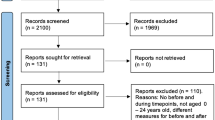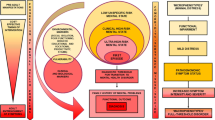Abstract
Current trends on the national landscape of available treatment and delivery systems for children and adolescents with serious emotional disturbance indicate a sharp decline in the availability of inpatient psychiatric services. These trends are troubling as six to nine million children and adolescents in the United States suffer from some serious emotional disturbance, and the majority in need of treatment do not receive behavioral health services. The consequences of untreated mental illness in children are grave, and the cost to society of children’s mental health problems is high in both human and fiscal terms. This paper will describe national trends in behavioral health in general and specifically children’s mental health, and will detail the experiences of many states to identify possible problems and pitfalls to downsizing and closing child and adolescent inpatient psychiatric beds.
Similar content being viewed by others
References
President’s New Freedom Commission on Mental Health Subcommittee on Children and Family Summary report. February 5, 2003. Retrieved March 14, 2005, from http://www.mentalhealth commission.gov/subcommittee/children_family020703.doc.
Report of the Surgeon General’s Conference on Children’s Mental Health: A National Action Agenda. Washington, DC, Department of Health and Human Services, 2000.
United States Department of Health and Human Services. Mental health: A report of the surgeon general. Rockville, MD, U.S. Department of Health and Human Services, Substance Abuse and Mental Health Services Administration, Center for Mental Health Services, National Institutes of Health, National Institute of Mental Health, 1999.
United States Public Health Service. Report of the surgeon general’s conference on children’s mental health: A national action agenda. Washington, DC, Author, 2000.
Friedman RM, Katz-Leavy JW, Manderscheid RW, et al: Prevalence of serious emotional disturbance: An update. Rockville, MD: Mental Health United States, 1998, U.S. Department of Health and Human Services, Substance Abuse and Mental Health Administration, 1998.
Child and adolescent special population work group. Final report and recommendations to the Commission of the Department of Mental Health, Mental Retardation and Substance Abuse Services and the restructuring policy advisory committee, VA, 2004. Retrieved March 7, 2005, from www.dmhmrsas.va.us/documents/CFS-childrensSpecialPopulationReport.pdf.
Luby JL, Mrakotsky C, Heffelfinger A, et al: Characteristics of depressed preschoolers with and without anhedonia: Evidence for a melancholic depressive subtype in young children. American Journal of Psychiatry 161:1998–2004, 2004.
Friedman RM, Best KA, Armstrong MI, et al: Child mental health policy, in Mental Health Services: A Public Health Perspective, 2nd Edn. Edited by Levin BL, Petrila J, Hennessy, KD. New York, Oxford University Press, 2004.
Bazelon Center for Mental Health Law. Making sense of Medicaid for children with serious and emotional disturbance. Washington, DC, Author, 1999.
Semansky RM, Koyanagi C, Vandivort-Warren R: Behavioral health screening policies in Medicaid programs nationwide. Psychiatric Services 54:736–739, 2003.
Pottick KJ, McAlpine DD, Andelman RB: Changing patterns of psychiatric inpatient care for children and adolescents in general hospitals, 1988–1995. American Journal of Psychiatry 157:1267–1273, 2000.
Washington State Emergency Medical Services for Children. Hospital emergency departments and children/adolescents with mental health concerns in Washington state: A summary of issues. Seattle, WA: Department of Health and Human Services, Health Resources and Services Administration, Emergency Medical Services for Children, October 2001.
Pottick KJ, Warner LA, Isaacs M: Children and adolescents admitted to specialty mental health care programs in the United States, 1986 and 1997, in Mental Health, United States, 2000. Edited by Manderscheid RW, Henderson MJ. Rockville U.S. Department of Health and Human Services (Pub. No. (SMA) 3938), Substance Abuse and Mental Health Services Administration, 2004.
Hacker K, Drainoni ML: Mental health and illness in Boston’s children and adolescent: One city’s experience and its implications for mental health policy makers. Public Health Reports, July/August 2001.
Villani VS: Children’s services, in Textbook of Administrative Psychiatry, 2nd Edn. Edited by Talbott JS, Hales RE. Washington, DC, American Psychiatric Publishing, 2001.
Campaign for Mental Health Reform. Early detection of mental health problems in children and adolescents. Retrieved March 3, 2005, from http://www.mhreform.org/policy/positions/earlydetection.htm.
National Mental Health Association (n.d.). Too many youth and families do not receive care [Flyer]. Retrieved March 23, 2005, from http://www.nmha.org.
Weersing VR, Brent DA: Cognitive-behavioral therapy for adolescent depression: Comparative efficacy, mediation, moderation, and effectiveness, in Evidence-based Psychotherapies for Children and Adolescents. Edited by Kazdin AE, Weisz JR. New York, Guilford Press, 2003.
Gonzalez JE, Nelson JR, Gutkin TB, et al: Rational emotive therapy with children and adolescents: A meta-analysis. Journal of Emotional and Behavioral Disorders 12(4):222–235, 2004.
Donaldson D, Spirito A, Esposito-Smythers C: Treatment for adolescents following a suicide attempt: Results of a pilot trial. Journal of the American Academy of Child and Adolescent Psychiatry 44:113–120, 2005.
Manderscheid RW, Henderson MJ: Mental Health, United States, 2002. DHHS Pub. No. (SMA) 3938. Rockville, MD, Center for Mental Health Services, Substance Abuse and Mental Health Services Administration, 2004.
Geller JL: Mental health services for the future: Managed care, unmanaged care, mismanaged care, in Humane Managed Care? Edited by Schamess G, Lightburn A. Washington, DC, NASW, 1998.
Dorwart RA, Epstein SS: Privatization and Mental Health Care: A Fragile Balance. Westport, CT, Auburn House, 1993.
Geller JL: Any place but the state hospital: Examining assumptions about benefits of admission diversion. Hospital and Community Psychiatry 42:145–152, 1991.
National Association of State Mental Health Program Directors Research Institute, Inc. State mental health agency profiling system: 2002. Retrieved February 22, 2005, from http://www.nri-inc.org/Profiles02/Report02.cfm, 2003.
Boothroyd RA, Kuppinger AD, Evans ME: Understanding respite care use by families of children receiving short-term, in-home psychiatric emergency services. Journal of Child and Family Studies 7:353–376, 1998.
Lutterman T, Hollen V, Shaw R: Funding Sources and Expenditures of State Mental Health Agencies: Fiscal Year 2002. Alexandria, VA, NASMHPD Research Institute, 2004.
Challenges facing behavioral health care. Washington, DC, National Association of Psychiatric Health Systems, 2003.
Appelbaum PS: The “quiet” crisis in mental health services. Health Affairs 22(5):110–116, 2003.
Frank RG, Goldman HH, Hogan M: Medicaid and mental health: Be careful what you ask for. Health Affairs 22(1):101–113, 2003.
Roseman PV, Linder SH: A comparison of the performance of for-profit and nonprofit U.S. psychiatric inpatient care providers since 1980. Psychiatric Services 54:183–187, 2003.
Burns BJ, Hoagwood K, Mrazek PJ: Effective treatment for mental disorders in children and adolescents. Clinical Child and Family Psychology Review 2:199–254, 1999.
Scallet L, Bush S, Rockwood M: Enhancing Youth Services, 2000. Retrieved January 5, 2005, from http://www.naphs.org/youth_services/lewinpaper.html.
Teplin L, Abram K, McClelland GM: Psychiatric disorders in youth in detention. Archives of General Psychiatry 59:1133–1143, 2002.
General Accounting Office (GAO) finds inappropriate child placements in welfare, juvenile justice systems to obtain mental health care. Psychiatric Services 54:923, 2003.
Juvenile detention centers: Warehousing children with mental illness. An open letter to members of Congress signed by more than 130 national and state advocacy groups, July 7, 2004. Retrieved March 12, 2005, from http://www.bazelon.org/issues/children/7-7-04jjsignonltr.htm.
National Survey finds thousands of children with mental illness “warehoused” in juvenile detention centers. Psychiatric Services 55:955–956, 2004.
Mrazek DA: A crisis in child psychiatric services delivery: Why hasn’t the piper been paid? Mayo Proceedings 76:1078–1080, 2001.
Haugh R: A crisis in adolescent psych. Hospital and Health Network 77(1):38–41, 2003.
Eamons MK: Institutionalizing children and adolescents in private psychiatric hospitals. Social Work 39(5):588–594, 1994.
Molidor CE: Treatment of children and adolescents, in Mental Health Policy and Practice Tomorrow. Edited by Watkins TP, Callicut JW. Thousand Oaks, CA, Sage, 1997.
Weithorn LA: Mental hospitalization of troublesome youth: An analysis of skyrocketing admission rates. Stanford Law Review 40:773–838, 1988.
2002 CMHS Uniform reporting system output tables.
Hunter RW, Friesen BJ: Family-centered services for children with serious emotional, behavioral, and mental disorders, in Families and the Mental Health System for Children and Adolescents. Edited by Heflinger CA, Nixon CT. Thousand Oaks, CA, Sage Publications, 1996.
Saxe L, Cross T, Silverman N: Children’s mental health: The gap between what we know and what we do. American Psychologist 43:800–807, 1988.
Taube CA, Barrett SA: Mental health, United States, 1985. DHHS Pub No. (ADM) 85-1378. Washington, DC, National Institute of Mental Health, 1985.
Manderscheid RW, Sonnenschein MA: Mental health, United States, 1992. DHHS Pub. No. (SMA) 92-1942. Washington, DC, Center for Mental Health Services and National Institute of Mental Health, 1992.
Manderscheid RW, Atay JE, Hernandez-Cartagena MR, et al: Highlights of organized mental health services in 1998 and major national and state trends, in Mental Health, United States, 2000. Edited by Manderscheid RW, Henderson MJ. Rockville, MD, U.S. Department of Health and Human Services, Substance Abuse and Mental Health Services Administration, Center for Mental Health Services, 2001.
National Association of Psychiatric Health Systems Annual Survey: Final Report (1994). Washington, DC, Author, 1993.
National Association of Psychiatric Health Systems (1996). Trends in Psychiatric Health Systems: 1996 Annual Survey Report. Washington, DC, Author, 1996.
National Association of Psychiatric Health Systems. Trends in Behavioral Healthcare Systems: A Benchmarking Report. 2002 Annual Survey Report. Washington, DC, Author, 2003.
National Association of Psychiatric Health Systems. National Trends in Behavioral Care: 2003 Annual Survey. Washington, DC, Author, 2004.
Kanapaux W: Child psychiatry faces workforce shortage. Psychiatric Times pp. 1–2, 7, March 2004.
California Institute for Mental Health. Psychiatric hospital beds in California: Reduced numbers create system slow-down and potential crisis. A report from the California Institute for Mental Health, California, Author, August 2001.
Costello EJ, Angold A, Burns BJ, et al: The Great Smoky Mountains study of youth: Goals, design, methods, and the prevalence of DSM-III-R disorders. Archives of General Psychiatry 53:1129–1136, 1996.
Marshall S: Children psychiatric cases double in ER’s. Retrieved February 22, 2005, from http://www.namiscc.org/News/index.htm.
Massachusetts Citizens for Children. Treatment and intervention: The essentials to healing. A state call to action: Working to end child abuse and neglect in Massachusetts, April 2001. Retrieved March 15, 2005, from http://www.masskids.org/cta/.
Washington State Emergency Medical Services for Children. Hospital emergency departments and children/adolescents with mental health concerns in Washington state: A summary of issues. Seattle, WA, Department of Health and Human Services, Health Resources and Services Administration, Emergency Medical Services for Children, October 2001.
Ringel JS, Sturm R: National estimates of mental health utilization and expenditures for children in 1998. Journal of Behavioral Health Services & Research 28(3):319–333, 2001.
Little Hoover Commission: Young hearts and minds. Making a commitment to children’s mental health. California, Author, October 2001.
Foster P: Psychiatric hospital beds in California: Reduced numbers create system slow-down and potential crisis. California Institute for Mental Health, 2001. Retrieved March 7, 2005, from www.cimh.org/downloads/Acute_Services_Report_Final.pdf.
Mental health service costs offset by savings in other public sectors, March 25, 2005. Retrieved March 25, 2005, from http://live.psu.edu/index.php?sec=v5&story=11080&pf=1.
Poitras C: Report criticizes mental health program: Lack of services cited in state’s KidCare initiative. Hartford Courant p. B1, August 19, 2003.
Hansen JO: A perilous prescription. Atlanta Journal-Constitution p. 15A, (June 13, 2004).
Nierman P, Lyons J: Shifting resources to the community: Closing the Illinois State Psychiatric Hospital for Adolescents in Chicago. Psychiatric Services 52:1157–1159, 2001.
Holcomb J, Heyrman M: Closing a state hospital [Letter to the editor]. Psychiatric Services 53:1179–1180, 2002.
Nierman P, Lyons J: In reply [Letter to the editor]. Psychiatric Services 53:1180, 2002.
Nikolai G: Former Top Doc: Focus on Kid’s Mental Health. Rockford, IL, Rockford Register Star p. 1C, September 21, 2004.
Substance Abuse and Mental Health Services Administration managed care tracking, 2005. Retrieved March 7, 2005, from http://alt.samsha.gov/SBHH/viewcurrent.asp.
Remal G: State works to help mentally ill prisoners. Morning Sentinel. Retrieved December 21, 2004, from http://morningsentinel.mainetoday.com/news/local/1206663.shtml.
Walsh B: Castaway Children: Maine’s Most Vulnerable Kids. Portland Press Herald News, August 19, 2002.
Dickey B, Normand S, Norton EC: Managed care and children’s behavioral health services in Massachusetts. Psychiatric Services 52:183–188, 2001.
Goldberg C: Children Trapped by Gaps in Treatment of Mental Illness. New York Times, July 9, 2001.
Potts L: Monique: Teen with a history of mental problems fights the shadows, voices in a youth offender facility. Detroit Free Press, September 7, 2004. Retrieved December 27, 2004, from http:www.freep.com/news/health/monique7_20040907.htm.
Office of the Ombudsman for Mental Health and Mental Retardation. Mental Health—A System in Crisis, March 2003. Retrieved March 6, 2005, from http://www.ombudmhmr.state.mn.us/reports/asystemincrisis.htm.
Benson L: A needless suffering, February 9, 2004. Retrieved March 6, 2005, from http://news/minnesota.publicradio.org/features/2004/02/09_bensonl_mhchildpsych/.
Minnesota Psychiatric Society Task Force Report. The Shortage of Psychiatrists and of Inpatient Psychiatry Bed Capacity, September 2002. Retrieved March 6, 2005, from www.mnpsychsoc.org/TFRpt.pdf.
Marcotty J: Outpatient Psychiatric Care is Scarce. Minneapolis, MN, Star Tribune, p. 1B, December 3, 2004.
Redeffer L: Two Tiers of Youth. Southeastern Missourian, January 10, 2005.
Substance Abuse and Mental Health Services Administration National Mental Health Information Center. 2002 estimates of children & adolescents with serious and emotional disturbance by state, 2002. Retrieved March 13, 2005, from http://www.mentalhealth.samhsa.gov.
Pires SA: Promising approaches for behavioral health services to children and adolescent and their families in managed care systems: Managed care design and financing. Tampa, FL, Research and Training Center for Children’s Mental Health Department of Child and Family Studies, National Technical Assistance Center for Children’s Mental Health Georgetown University Center for Child and Human Development, Human Service Collaborative, 2002.
Friedman RM: Recommendations to the Superior Court: Slocum v. Perselay, August 1990.
Office of the Child Advocate Report Arthur Brisbane Child Treatment Center Investigation: An examination of conditions of care and recommendations for reform, May 2004.
Arthur Brisbane Child Treatment Center Workgroup. Report of the ABCTC Workgroup. Recommendations for: Replacing the level of care provided by ABCTC, September 2004.
New Jersey Psychiatric Association Task Force. Mental Health Needs and Services in New Jersey. Prepared by the New Jersey Psychiatric Association Task Force to Assess Mental Health Needs and Services in New Jersey and the New Jersey Psychiatric Association Mental Health Services Committee, May 17, 2004.
Governor’s Task Force on Mental Health. Final report: New Jersey’s long and winding road to treatment, wellness and recovery. Author, March 31, 2005.
Schuppe J: Child advocate says county detention centers are being illegally used. Star-Ledger, November 23, 2004. Retrieved December 20, 2004, from http://www.shanj.org/News/mentally_ill_youths_are_illegally_detained.htm.
Schuppe J: Trenton depends on other states to treat troubled kids. Star-Ledger, November 24, 2004. Retrieved December 20, 2004, from http://www.nj.com/statehouse/ledger/index.ssf?/base/news-2/1101281369297450.xml.
Help now for troubled kids. Star-Ledger, December 9, 2004. Retrieved December 20, 2004, from http://www.nj.com/opinion/ledger/editorials/index.ssf?/base/news-2/1102573411252550.xml.
Lagoe R, Mankiewicz D: Children Need More Mental-Health Care to Tide Them Over. Syracuse, NY, Post-Standard p. A9, June 27, 2004.
Jacobs J: Mental illness crunch stresses everyone: Lack of mental health beds means many area kids must be treated in distant cities. Syracuse, NY, Post-Standard p. A1, May 17, 2004.
Kids deserve better; youths with mental disorders fall into a patchwork system of care Syracuse, NY, Post-Standard April 13, 2004.
Wolfer S, Newmyer T: Psychiatric closings hit. Daily News p. 1, February 20, 2003.
Ramirez M: Propose closings prompt protests. Newsday p. A21, May 10, 2003.
Egbert B: Hearing tomorrow on plan to shut mental hospitals. Daily News p. 1, May 8, 2003.
Pyle E: Psychiatric care: Treatment options for kids dwindling. Columbus Dispatch p. 1A, March 3, 2003.
Bonfield T: One family’s nightmare: “It’s mind-bogglingly unfair.” Cincinnati Enquirer p. 01-A, December 3, 2000.
Koyangi C, Semansky R: Assessing Child Mental Health Services in the Oregon Health Plan. Washington, DC, Bazelon Center for Mental Health Law, 2002
Twedt S: Juvenile justice and mental health: As two worlds collide, teens suffer, 2001. Retrieved March 5, 2005, from http://www/post-gazette.com/headlines/20010716juvdaytwomainnat2p2asp.
Twedt S: Lack of options keeps mentally disturbed youth locked up, 2001. Retrieved March 5, 2005, from http://www.post-gazette.com/headlines/20010715juvenilejp1.asp.
Twedt S: Incarceration in Florida exacerbates problems for aggressive, mentally ill boy, 17, 2002. Retrieved March 5, 2005, from http://www.post-gazette.com/regionstate/20020204michael0204p2.asp.
Burris RA: Plan shapes up to move mentally ill patients from Columbia, S.C. facility. The State, January 9, 2005.
Saunders RC, Heflinger CA: Access to and patterns of use of behavioral health services among children and adolescents in TennCare. Psychiatric Services 54:1364–1371, 2003.
Bender E: State seeks solutions to foster-care crisis. Psychiatric News pp. 8, 58, January 21, 2005.
Joint Committee Study Treatment Options for Offenders with Mental Illness and Substance Abuse Disorders (SJR440), June 28, 2001. Retrieved March 5, 2005, from http://dls.state.va.us/pubs/legisrec/2001/sjr440c.htm.
Martz M: SW VA Seeking local treatment. Richmond Times Dispatch p. A8, February 10, 2004.
Chan S: Report assails D.C. on children’s mental health care. Washington Post B5, August 6, 2003.
Geller JL, Fisher WH: Transitional residences in the linear continuum: Debunking the myth. American Journal of Psychiatry 150:1070–1076, 1993.
Author information
Authors and Affiliations
Corresponding author
Rights and permissions
About this article
Cite this article
Geller, J.L., Biebel, K. The Premature Demise of Public Child and Adolescent Inpatient Psychiatric Beds. Psychiatr Q 77, 251–271 (2006). https://doi.org/10.1007/s11126-006-9012-0
Published:
Issue Date:
DOI: https://doi.org/10.1007/s11126-006-9012-0




